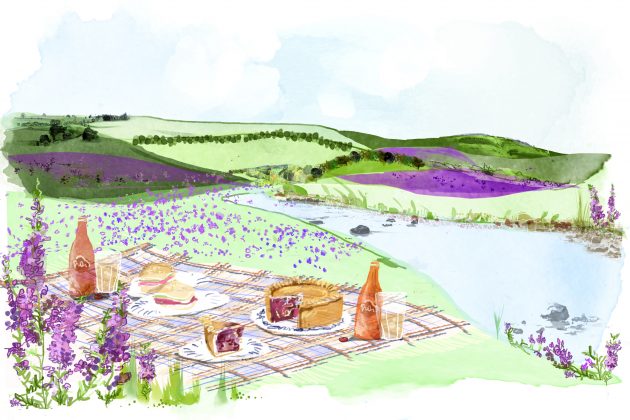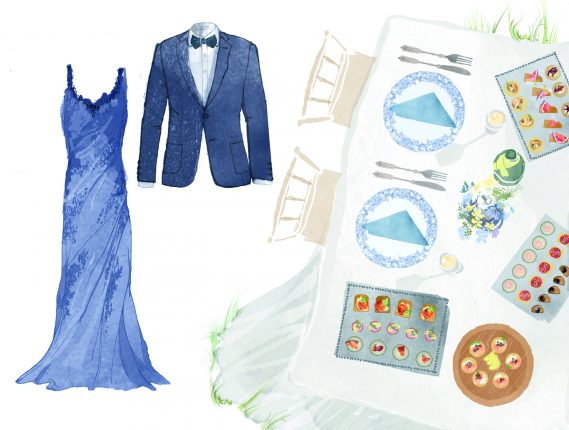Eat your way through the picnic season with panache as only the British can, writes Sarah Fitzpatrick
Outdoor eating hits its zenith during the English summer season (or picnic season). At great houses, on riverbanks and at the races we picnic, never to be outdone, never retreating from the elements and always prepared. So limber up your buttering arm and, for God’s sake, don’t forget to pack the bottle opener and baby wipes, which are excellent for getting sauce splodges out of your best bib and tucker.
(Find The Field’s picnic recipes here.)
THE FIELD‘S GUIDE TO THE PICNIC SEASON
ROYAL ASCOT
17-21 JUNE

The Royal meeting at Ascot is the picnic Olympics. For this is a blue-riband and blue-blooded affair and one cannot start preparations too early (it takes decades to acquire a coveted spot in Car Park Number 1, although spaces can now be used by family and friends too). Enclosure badge holders who haven’t made it yet can have a jolly time in Car Park Number 7, with picnicking taking on a great range of styles here, from picnic blankets on the ground to picnic tables and folding chairs as well as a few small gazebo tents, which have been known to lift off when the wind gets up. (Read our guide to the best picnic blankets.)
But the real action is in Number 1. Crisp table linens and centrepieces are the norm; suffice to say that it is really not possible to go over the top here. Hosts will have spent the previous day (or week) roasting a whole fillet of beef, cooking a ham, baking a game pie and so on, and the whole must be transported – with furniture – to Ascot to be enjoyed before racing begins. An early start for hosts, although the dedicated rent a house nearby for the week. Suitable vehicles such as Rolls-Royces and Range Rovers are simply the practical choice to transport food and friends, although a vintage Bentley passes muster.
There is often the added excitement of having to leap up and concertina your spread as a late-arriving neighbour you hoped wasn’t coming makes a hash of parking next door. Get to know your neighbours – it’s lovely when one says they aren’t making it on a certain day and you can spill over at will. The real challenge for the picnic host is packing it all away neatly and keeping it cool so that a good spread can be conjured up again in moments after the last race. More drinks and more blotting paper are always required. Curling sandwiches and warm beverages are never welcome, so think teatime: home-made biscuits, a fruit cake, a little something savoury – though it’s worth remembering that cheese can be difficult to keep in the heat. Be prepared for hordes of acquaintances to call in for drinks and more as they totter past, especially if you have a spot near the entrance.
One important thing to remember for those who like to linger: as you pop some tunes on for the tailgate after-party, keep an eye on the car battery level. Nothing spoils the vibe like being unable to start the car and having to resort to the AA when it’s time to go home.
HENLEY ROYAL REGATTA
1-6 JULY

At Henley there is a host of catering options, from breakfast buns to oysters to your own table for the day at the Mile & 1/8th restaurant providing a three-course lunch and strawberry cream tea in the Stewards’ Enclosure. Pimm’s is free-flowing as world-class racing takes place on the river, but where are the serious picnickers? (Read how to make your own Pimm’s.)
Food and drink may not be brought into the enclosures, but a certain class of Englishman is always happiest taking his own line. Those few who have access to enjoy the regatta from the water are picnicking royally on their boat, bottles keeping cool in a creel popped over the side. If you are without a boat, it’s the car park – Lion Meadow is where the Stewards picnic and Butler’s Field is the next best spot for picnic season to take place. Channel Ascot but with a summer breeziness: striped blazers and jugs of Pimm’s.
HIGHLANDS
JULY – SEPTEMBER

The British have always done great meals on the move. Cornish pasties are the original and perfect little parcel to take anywhere: hold the ridged crust with dirty hands while you enjoy buttery, crumbly pastry containing a rich savoury or sweet filling before getting on with the day’s work. A sandwich box with the addition of a slice of fruit cake keeps hunters’ tummy rumbles at bay, and the stalker’s piece may be modest – a well-filled bread roll (or cob as we would say in Leicestershire) with a piece of tablet or chocolate bar – but it is elevated to fine dining by a keen hunger sharpened on the hill and a majestic heathery setting.
For the hill, use greaseproof paper and tie up bundles with butcher’s string – this is no place for cling film. Or leave a feast in a bothy or fishing hut to return to: think game pie, cold meats, ginger beer and home-made cake. You can recline on a blanket or sometimes take advantage of a rickety trestle table by the hut. The finest I remember was a riverside barbecue, set going in half an oil drum at the start of the day and perfectly settled for cooking delicious foraged chanterelles beside a lack of fish.
PETERBOROUGH ROYAL FOXHOUND SHOW, FESTIVAL OF HUNTING
16 JULY

While there is always the Vice-President’s Luncheon in the marquee, the ultimate spot is at the hunt lorries in the car park. As the champion hound show has grown into a full-blown festival of hunting, so its picnics have grown in stature. Those given the lucky nod gather at the back of a car, horsebox or hound lorry. It’s not quite a full puppy-show tea but is heading in that direction with wonderful cakes, sandwiches and straw hats accompanied by a heavenly soundtrack courtesy of hounds waiting to take to the ring. A friendly rivalry seems to be growing between hunts for the finest spread. This year the best picnic competition will be judged by experienced picnicker and Editor of The Field Alexandra Henton. “The best sort of picnic is made by the conviviality of the guests but don’t forget the condiments – a Melton Mowbray pork pie without English mustard is a sorry addition to a table,” she says.
GLYNDEBOURNE FESTIVAL
UNTIL 25 AUGUST

All shall dine at Glyndebourne and in style too. Picnic season is at its height here. The grounds usually open at 3pm but check the performance schedule, as one would expect it is important to arrive promptly to secure a good spot. You may also want to leave time to explore the magnificent gardens, praised by Vita Sackville-West, before settling in. If you are lucky enough to pitch camp near the rehearsal rooms, you are likely to have the pleasure of hearing the company warming up in the background as you lay the table. Look out for helpful front-of-house staff with a buggy to help you transport picnic furniture and baskets into the gardens if you don’t have a team of Sherpas with you. Do use a linen tablecloth and add a posy or two of flowers. Then it’s time to pop the champagne corks and enjoy canapés in black-tie before the performance.
The 90-minute main interval provides time to dine in dinner-jacketed style, often smoked fish. It is possible to buy additions for your spread on-site from the Hamlet area as well as order a full picnic in advance to be collected on the day. For seriously inclement weather one might consider booking a table in one of the marquees and stretch tents or ditch the picnic and relax at the Middle & Over Wallop restaurant, overseen by the Michelin-starred Galvin Brothers.
Performances are timed to accommodate the last train back to London from Lewes and, unlike Ascot, this is not an occasion to host a riotous after-party at your table. Simply roll home unencumbered, having had the empty bottles collected on site so there’s less to lug back to the car.
BURGHLEY HORSE TRIALS
4-7 SEPTEMBER
Burghley is serious; the world’s greatest five-star eventing competition is a Mecca for equestrians. The monumental three-day event runs alongside Pony Club competitions and the hotly contested Burghley Young Event Horse. It’s a major occasion for shoppers too, and good food is essential for keeping your strength up. Picnicking takes the plate for many. The Food Walk is extensive and mouth-watering, so provisioning on site is a joy as long as you want an early lunch; leave it too late and you will spend an hour queuing. If you have access to forward parking, then it is easy to pop back to the car to drop off purchases and relax over sandwiches, excellent local cheeses, sausage rolls and a glass of wine. No need for table dressing here – think rustic fare on the hoof while discussing the horses and how you’ll ever fit the new dog bed/bird table/hen house/ nesting log baskets into the car.
If the desire to see specific horses as well as hit the shops means time is short, you will have to eat on the go. The poacher’s pocket in old Barbour jackets carries the bag from a wine box perfectly so you can transform yourself into a mobile bar. A couple of picnic glasses in one cartridge pocket and a good roll in the other, and you can set up camp Miss Bartlett-style on a mackintosh square at your fence of choice to enjoy the action. Don’t forget to collect your free copy of The Field from our trade stand to leaf through if there is a hold-up on course. At the end of the day, a nice cup of tea from the thermos is what you need to set you up for the drive home.
You might also like to read how to make the ultimate point-to-point picnic.
This article on the picnic season was originally published in 2023 and has been updated.





